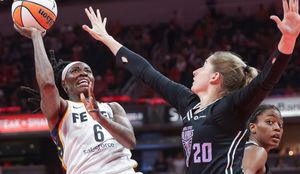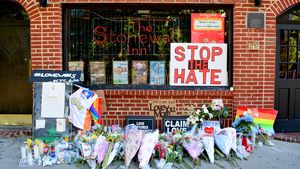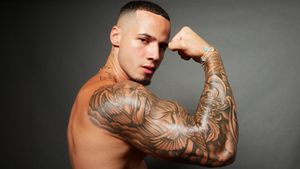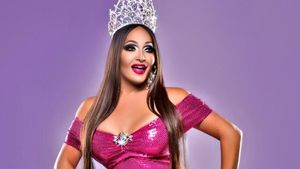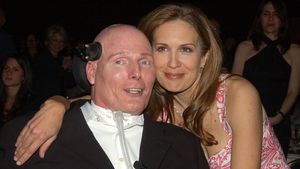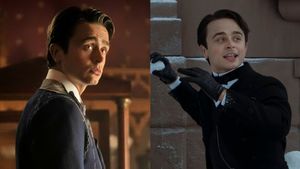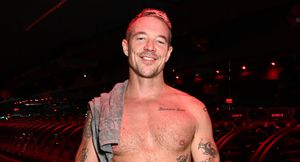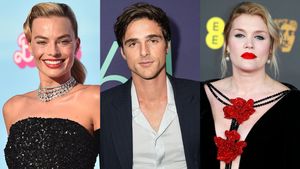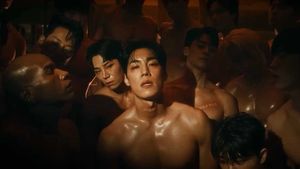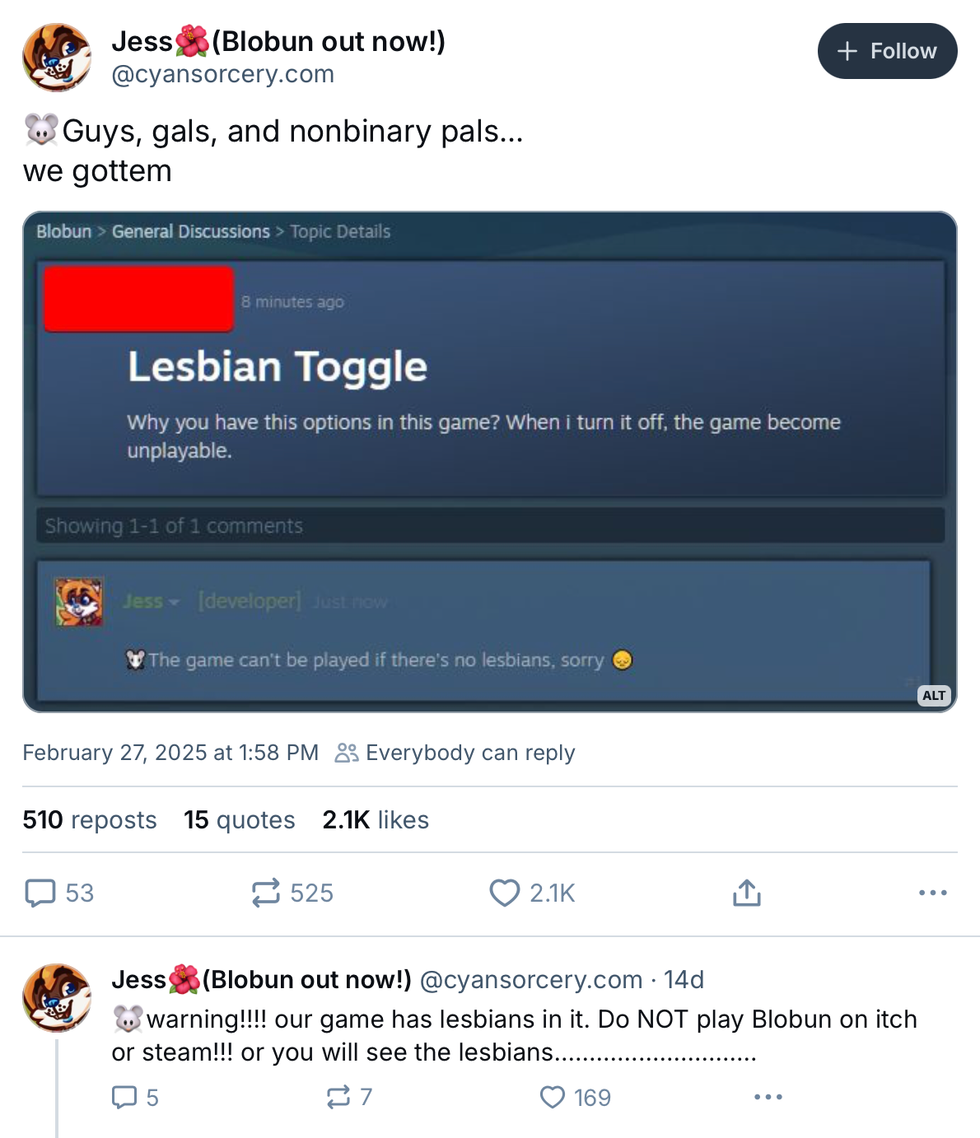If you're not reading comiXology's latest original digital comic series 'Quarter Killer' yet, you should be!

Set in an Afrofuturistic world and featuring an incredibly diverse cast of characters that includes a queer protagonist, Quarter Killer is exactly the kind of series the cyberpunk and science-fiction genres so desperately needs!
"Hip-hop inspired cyberpunk Robin Hood of the 'hood, this action-packed, cyberpunk series tells the story of Quentin Kidd A.K.A. QK, an ex-corporate computer hacker who offers their services to those willing to pay them with old skool currency, specifically quarters, because quarters are untraceable," reads the series description. "QK only has two rules: they don't work for criminals or police, and no killing."
PRIDE got to chat with Quarter Killer writers Vita Ayala and Danny Lore and artist Jamie Jones about the importance of creating a comic series that centers QPOC, and we've even got an exclusive preview of the upcoming second issue!
Scroll down to read our interview with the team and see exclusive images from Quarter Killer Issue #2 (which goes on sale on October 30)! And to catch up on QK Issue 1, and to preorder Issue 2, head over to comiXology!
PRIDE: There's a lot of series with queer characters, but they are so very often just side characters. Why was it important to have a prominent queer protagonist in 'Quarter Killer?'

Vita Ayala: For me it was important, because queer folks deserve to be the protagonists of stories as much as anyone else. But, that is more my overall mind set. In THIS case, QK is our main character (though the book is pretty ensemble), and they are queer. So, the protagonist is queer. There are other queer secondary characters, as well as hetero side characters. The perspective of this book is Danny and my own, and that is a queer perspective, so making the protagonist queer was the only choice that made sense.
Danny Lore: It’s important for me to show queer characters because that’s something that I craved so much growing up, and even now. The tides are shifting in really amazing ways, where we’re seeing queer characters in books across genres and styles, but also in the accessibility of those titles. Because it’s never been that we didn’t exist as protagonists, it’s that it has been a struggle to access those books! So every story I get to create, I try my darnedest to center queer characters, because then maybe someone—kid or adult—will find them, and see themselves in the center of the adventures that we enjoy! In terms of QK being the protagonist, it really boils down to: why the heck not? Why shouldn’t we have a Black non-binary protagonist fighting the system, alongside their husband and family? There’s no good reason, and so we decided to just be ourselves, and that means telling brown queer tales.
PRIDE: What sparked the creation of 'Quarter Killer?' How did you all go about assembling this team to start working on the actual comic? How did you all get started in working with comiXology to release it?

Vita Ayala: QK sprung from Danny and my’s friendship. The concept of the Quarter Killer–a Robin Hood of the ‘hood sort of character, who took payment in quarters so they could play arcade games and call their mama—was like our second idea as friends. Our relationship has always been one of riffing creatively, and this was one of the MANY ideas we have come up with.
We knew we wanted to work with folks who got It, and who had an energetic, vibrant style. I met Jamie a few years ago, and I told him about the idea casually. He really liked it, and after seeing his work, I knew I would LOVE to work with him. Danny loved his work too, and it was all uphill from there.
I was approached by Chip, who had read some of my work, and was interested in maybe working together. He was VERY open to all the pitches I sent, and when he asked which I was most passionate about, I spoke honestly—QK has had a special place in my heart for the better part of ten years! The more we sent Chip and comiXology, the more excited they were about it. It has been great!
PRIDE: What sparked the creation of 'Quarter Killer?' How did you all go about assembling this team to start working on the actual comic? How did you all get started in working with comiXology to release it?

Danny Lore: When Vita and I met, we immediately started coming up with bizarre stories, and this was the story. The story that we kept close to our heart because one day, come hell or overpriced quarter water, we were going to make it happen. When Vita introduced me to Jamie and his work, I was absolutely blown away by his style—the energy and style! Plus we’re all giant nerds when it comes to retro stuff, so it really did just come together instantly. It was all a question of where, and Chip was really passionate about whatever project Vita pitched being a dream project—and allowed us the space to really play with it! Add Ryan’s genius lyrical lettering to the mix, and QK was born!
Jamie Jones: I met Vita a few years back at a convention and we really hit it off. And becoming "fast friends" in comics translates to, "We should make a book together." Little did I know that Vita and Danny had a gem of an idea that was Quarter Killer. They sent me some character names and setting ideas and I started sketching. I think the first sketch of QK was done almost three years ago. I had worked with Ryan Ferrier before on a back up comic for Violent Love (Image) and he’s one of my favorite people in the game and I was super happy we could bring him on.
PRIDE: Did you draw inspiration from any other cyberpunk and/or science fiction titles when writing and illustrating 'Quarter Killer?'

Vita Ayala: Absolutely. Quarter Killer is all of our love letters to the things we loved growing up, and the stories that shaped us as people. Danny is a Gibson/Neuromancer person (I love it too, but that is their J A M), and I am a Stephenson/Snow Crash junky. We both love Japanese cyberpunk, and Afrofuturism. We both love the big Star franchises (Wars and Trek). There is a lot of science fiction influence happening here, as well as video games. And the foundation is hip-hop, absolutely.
Danny Lore: I’m a massive cyberpunk fanatic! Right now, my biggest influence when writing QK is Shadowrun, both the old SNES game and the tabletop RPG. The ways in which it flows from black trenchcoat grittiness to pink mohawk flashiness is the kind of thing I strive to embody in every line I contribute. Neuromancer is a novel that influences everything I write, as well as Gibson’s short story collection Burning Chrome. Plus I’ve been fortunate to spend the past few years working with the Hugo-nominated short story magazine FIYAH, which caters to Black SFF writers. A lot of inspiration comes from seeing those stories, seeing our various voices across the diaspora, and the kind of confidence that grows from being a part of that community—and that concept, that community essence, really fuels the story lines in QK.
Jamie Jones: Constantly. I love old comics, so I tend to pull things from Alex Raymond’s Flash Gordon, John Carter, Adam Strange and vintage sci-fi mags. And then I take those shapes and add a heavy dose of '80s hip-hop and get the look for QK.
PRIDE: What do you think it is about cyberpunk, and sci-fi in general, that so many queer people are fans of?

Vita Ayala: I am not sure about other folks, but for me, cyberpunk is about marginalized people using the tools of oppression to change both themselves and their environment in a way that gives them (some) power. Cyberpunk is techno-noir, which, noir is another genre that I think a lot of queer folks connect with. The play with the tropes has always been very appealing, and the room for ambiguity and identity that other genres tended to shut down is something I love.
Science fiction, as a genre that is concerned often with the future, appeals to me (and I think a lot of queer folks) because of how DIFFERENT things can be there. Gender, sexuality, family dynamics, all of it is fair game in sci-fi because it is not rooted in the NOW.
Also, both cyberpunk and sci-fi have a lot of room for people of color and non-conforming expressions of self that are very much queer coded.
Danny Lore: Vita and I are in agreement about the connections between noir, cyberpunk, and marginalization. I wanted to add, as well, that for me, cyberpunk is also a path to talking about transhumanism, about our relationships to space and reinvention, and therefore queerness as it pertains to self-identification. Cyberpunk is the exploration of what your body is, what your mind is, and where the two meet and where they don’t.
PRIDE: Can you speak about the importance of POC sci-fi fans being able to see themselves represented in their faves comics? And did you all have any queer or POC role models in comics and other media when growing up?

Vita Ayala: The fact that Nichelle Nichols (on Star Trek: The Original Series) was credited by the first Black Astronauts as the reason they thought they had a place in space is powerful and telling. Both for THEM to have suddenly understood that they had a place in the future and among the stars, but also that folks different than them also were confronted with that too.
I would not be writing today if not for Octavia Butler. There is no better example of why representation matters–why having the space for POC and queer folks to be the CENTER of the story–is important.
I was lucky in that my mother was all about exposing me to media that either had prominent POC, women, and queer people, or was about them. Storm and Bishop were my two first X-Men. Star Trek (all of them) were on in my house weekly. My mother made sure that we saw ourselves in books, movies, music, etc. Even in media she didn’t really enjoy (poor woman had to watch The Craft like 100 times when I was a teenager), she knew it was important for me and my siblings.
PRIDE: Can you speak about the importance of POC sci-fi fans being able to see themselves represented in their faves comics? And did you all have any queer or POC role models in comics and other media when growing up?

Danny Lore: I honestly came into my Blackness as a writer in a very round-about way. I was fortunate enough to have parents that really made sure that I didn’t see my Blackness as a problem growing up (but rather that other people had problems with it), but I didn’t engage it in the SFF realm almost at all until college, for various reasons. My Black role models, then, were usually in other genres. I watched a lot of SNL and MAD TV, lots of Living Single and Martin and Girlfriends, and that was where I saw and understood people like me.
As I came to understand what being a Black voice was, and as I came to understand that as something I wanted to be, I discovered (and rediscovered) role models in the SFF world.
That’s one of the reasons I think it’s so important to have people who look like us and sound like us and share our experiences across all genres! As an adult, I’m having to learn again and again what it looks like when we exist in horror, in science fiction, in fantasy, as fully fleshed-out individuals. And it’s never too late, but I think of the stories I could have told earlier had I understood that.
PRIDE: How do you hope readers feel after they read 'Quarter Killer?' And what are your hopes for the future of this story?

Vita Ayala: I hope folks are energized, excited, and connect with the characters. I want them to love Q, Lo, Aya, and Hi Top as much as we on the team do. I want them to see the spectrum of identities that we have here and feel seen. I want them to see other folks that are different and empathize. And, of course, I want them to have fun! My hope is that we get to tell many, many stories about these characters and in the universe for years to come!
Danny Lore: I want people to have fun while they’re reading! I think we tell a really exciting story about family and technology and community. It touches on really complex topics while still providing a sense of adventure, and I think the cast is pretty darn likeable! And I hope that readers who create, or have considered creating their own work, get inspired to put their own voice out in the world afterwards! As for the future of QK—I can’t say the future’s not yet written, because literally there are written issues that are going to be available to you all, but past that I would love to keep telling tales with this team!
Jamie Jones: The best thing that could happen for this book is it goes on long enough for it to be obsolete or dated. To be living in a world where the need for a queer lead isn’t novel and where representation in media isn’t a talking point anymore. I guess my major hope is people get excited for the future. I am constantly bummed by the zombie apocalypse/hope is lost future that we get in sci-fi now. Let’s write our own future and let’s make it cool again.










